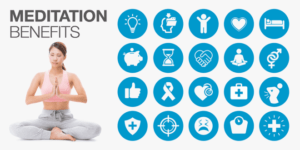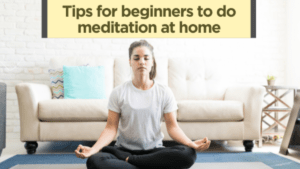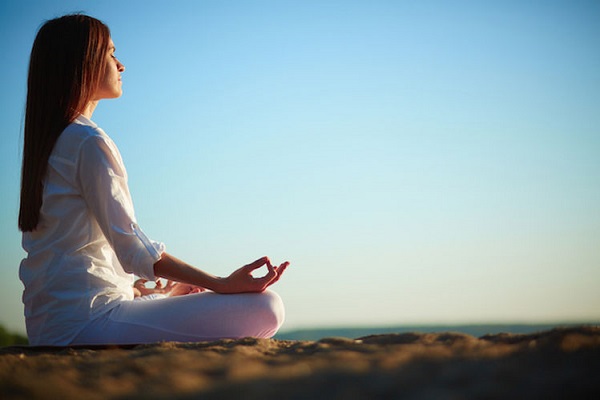Contents
What is Meditation?
Meditation is a practice that has been around for centuries and it’s not going away anytime soon. It’s something you can do at any time, anywhere, and there are many benefits to this stress-reducing activity. In this blog post, we’ll talk about how to meditate, how it helps you find clarity in your thoughts, and how it can help those with anxiety or other mental health issues as well as those who want to improve their focus on the task at hand.
Types of Meditation
When it comes to meditation, there are different types of it. Common ones are mentioned below:
Mindfulness Meditation
It works in a way that you focus on how your thoughts are formed. You also try to make sure that you don’t let them become distracting like how they usually do when people first start out with mindfulness meditation.
Transcendental Meditation
This is how it looks like if you are focused on how it works for your mind. You want to make sure that you don’t let any distractions take over, which makes this type very useful when people first start out with transcendental meditation.
Vipassana Meditation
This kind is the focus is on how your thoughts are formed. You also try to make sure that you don’t let them become distracting like how they usually do when people first start out with mindfulness meditation.
Guided Meditation
This type of meditation works in that you are constantly reminded of how it goes through visualization, which helps your mind take the steps needed in order to get into a meditative state.
Loving Kindness Meditation
This comes with a goal to teach you that you need to show love and kindness towards yourself, other people around you, or even animals.
Chakra Meditation
It works in a way to make you follow the seven chakra points and how energy flows up from your root to crown.
Zen Meditation
This type of it goes through controlling or having a higher awareness about how thoughts are going on in your mind at any given time, either good ones or bad ones, as well as being able to let them go and how you focus on your breath.
Yoga Meditation
It goes how you follow the mantra “so hum”, which means, how I am that or how everything around me and in me is all interconnected.
Meditation Music
With music is there are different types of meditations where it has many benefits for yourself such as deep relaxation, stress relief, how it’s how the sounds go into your body with how you listen to that.
Binaural Beats Meditation
In this, you’re listening to binaural beats which are basically frequencies for different parts in our mind and help us relax, focus on something specific, or help us sleep better at night.
Meditation Benefits
There are “n” number of benefits when it comes to meditating. The most common ones are as follows:
- Reduced Stress: Meditation reduces stress and meditation for beginners can help you stay calm.
- Less Anxiety: Meditation has been shown to reduce anxiety by as much as 39 percent, according to a Harvard study that was published in the American Psychological Association’s Journal of Psychosomatic Research. And another study found it reduced symptoms of panic disorder after just eight weeks.
- Improved Memory: It can improve memory and meditation for beginners is a great place to start.
- Increased Focus: It increases focus and its techniques are studies proven ways how to relax the mind. It lowers stress levels, reduces anxiety symptoms (i.e., panic attacks), improves concentration, enhances creativity, decreases depression symptoms, helps you sleep better at night, and even relieves pain.

- Reduced Pain: Meditation reduces pain and for beginners, it is a great way to start.
- Increased Immunity: Meditation increases immunity and its techniques are documented ways of improving mental clarity.
- Decreased Anxiety: Meditation decreases anxiety symptoms (i.e., panic attacks), improves concentration, enhances creativity, decreases depression symptoms, helps you sleep better at night, and even relieves pain.
- Spiritual Enlightenment: Meditation has been thought of as the practice for spiritual enlightenment and self-knowledge by many traditions including Buddhism, Hinduism, Jainism, Sikhism, and Taoist practices. It is also used in Christianity with some theologians recommending it on Christ’s Passion or meditating upon God’s Mercy.
- Increased Creativity: Meditation is thought to improve creativity because meditation may help the brain process information more efficiently. A study in 2011 found that meditation can actually change how people respond to stress and negative emotions which then improves their ability to be creative at work or school.
- Emotional Balance: Meditation can help individuals gain insight into the deeper aspects of their personality. The process allows a person to explore how they actually feel about certain thoughts and emotions, which then helps them determine if those feelings are healthy or unhealthy for themselves.
How to Meditate: For Beginners
It is how to clear your mind, calm yourself down and focus on one thing at a time. You are able to achieve this with it because by meditating you can decrease how much stress enters into the body as well as how many problems enter into life through stress. It’s easy to meditate! Just follow these simple guidelines:

- Lie down or sit comfortably, keep your back straight, close your eyes. If you are lying down, place pillows were needed to make sure that you how a straight spine when in this position.
- If sitting upright or laying down with good posture, bring the hands together and move them up toward the chest until they touch each other. The thumbs should be touching one another and the palms should be touching each other. If you are laying down, place your hands on top of one another and rest them in your lap or to the side of the body.
- Meditate how it feels for a few minutes by focusing only on how things feel inside yourself at this moment. This is not a time where you need to think or get stressed out about how it is or isn’t working.
- The entire point of how to do mediation, the idea behind it all is to take a moment for yourself and find peace within your mind and body. If you feel like thinking during this time, allow yourself to think without judgment but then return back to focusing on how things are feeling inside.
How to Meditate With Breathing
Another way in which you can learn how to meditate is through deep breaths. Again, this isn’t about thinking or doing things right but instead focusing on what’s really happening inside your body and mind at the current moment.
- Sit up straight in a chair with good posture so that there is minimal physical pain associated with how to meditate.
- Take a few deep breaths, in through your nose and out through your mouth. When you feel calm enough, imagine yourself in the place where you would like how to meditate most often or imagine what it is that brings on this feeling of peace inside. This will be something different for everyone how to meditate.
- When you have finished, take a few deep breaths on how to meditate, and reflect on how you feel now that your how to meditate is complete or if this exercise helped bring about the feelings of peace how to meditate.
Must-know Meditation Tips
Meditation is something you can do at any age and for anyone who wants to be calmer, focused, or relaxed. It’s beneficial for your physical state as well because it reduces stress levels which means better sleep & healthier lifestyle choices too!
- No expectation: meditation is not something to achieve results. It’s about showing up, relaxing, and being where you are.
- Turn off your phone: meditation should be done in a quiet place without any disturbances or distractions including cell phone notifications or alerts.
- Be comfortable: meditation requires breathing exercises which may cause shortness of breath but it doesn’t mean that meditating while laying on your back is the best position. You can sit, stand or lay down; it’s all up to you and what makes you comfortable.
- Practice: meditation requires time for practice before getting into a routine but once mastered, it will become an important part of your life allowing more free time with better focus, higher energy levels, and improved moods.
- Fix a time: meditation does not have to be done at the same time every day but it is recommended to set a meditation schedule. Meditation can be performed before work or after, in between breaks during lunchtime, or even right before bedtime if you are looking for some sleep meditation tips instead of meditation techniques that help with falling asleep.
- Create a meditation space: meditation does not have to be done in a specific meditation room but having a personal meditation area where you can practice every day will make it easier for you to get into the routine.
- Practice breathing before you start: The techniques that help with meditation start by focusing on your breathing. This is a great meditation tip since concentrating on the breath will also center you and prepare for it without going through any complicated steps first.
- Meditate every day: If possible, try to meditate every day as much as it fits into your schedule. Even short sessions of five-ten minutes will make it easier over time.
- Make your body stable while meditating: Meditation is not just about meditation techniques that strengthen your mind, but also these tips related to the positions to keep you comfortable. The more stable your body feels during the meditation session, the better it will be for you overall.
- Meditate in a quiet place: There are various music tracks available online if some type of sound helps with meditation for you. However, these tips on the positions suggest that you find a quiet place to meditate at least for the first few sessions.
- Address your emotions: its positions recommend dealing with any emotions you may be feeling before beginning to meditate.
- Reintroduce movement to your body gradually after meditating: music tracks can help you to stay focused during the meantime, but after meditating for minutes, you need to slowly begin moving your body again.
Meditation is a great way to clear your head, get calm, and find peace. If you’ve never tried it before or are looking for tips on how to do it, this blog post will give you all the information you need. We hope that these techniques help make your life better! People who have mastered the art of mediation can attest to its benefits. Everyone should try it sometime in their lives. Why not start now? The end result may be improved mental health (less stress), less anxiety (according to research), and more clarity about what matters most in life (a heightened sense of awareness). Who knows- maybe after meditating regularly for one week straight, we’ll see an improvement in our mood.
A Word From Mantra Care
Your mental health — your psychological, emotional, and social well-being — has an impact on every aspect of your life. Positive mental health essentially allows you to effectively deal with life’s everyday challenges.
If you are looking for affordable Online Counseling MantraCare can help: Book a trial therapy session


